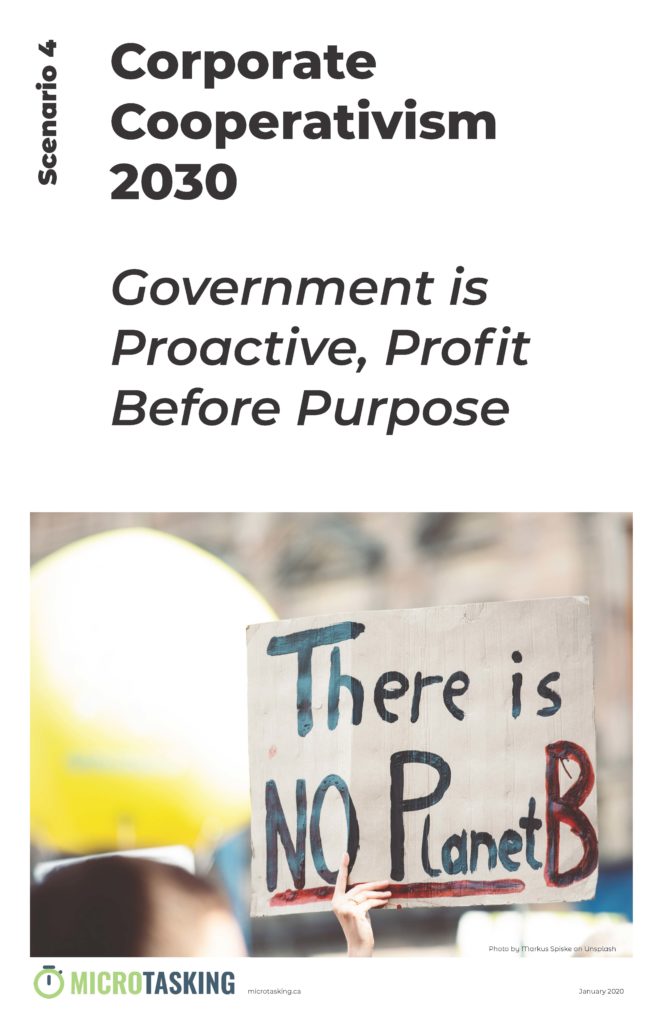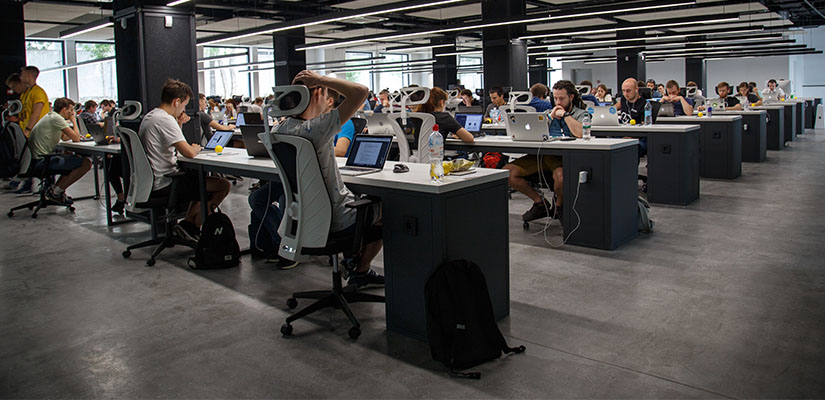
Scenario 4: Corporate Cooperativism
Government is proactive + profit before purpose
Microwork economies and winner-take-all profit motives are contentious. Concerns about climate change are paramount. And suddenly, mega-corps are aligned with environmental causes.
Note: Corporate cooperativism is a concept that developed out of the first workshop. It does not to our knowledge exist as a popular term. However, platform cooperativism is a movement that offers new models for microwork. Trebor Scholz’s work, Platform Cooperativism: Challenging the Corporate Sharing Economy, is a valuable resource. Also of note is the Platform Cooperative Consortium. In this scenario, profit before purpose has fostered multi-national, rather than worker involvement in cooperativism.
Scenario 4, Corporate Cooperativism, was developed at the microworking session held on December 10, 2019. The related persona is Dan Yoon.
Mega-corps dominate cooperativism
Overall, this pervasive business model is “corporate cooperativism”. Through their supply chain, corporations arrange a network of microwork interactions. Then, they use their networks to set global precedents and establish economic norms.
However, the government is trying to limit corporate influence. Through partnerships with industry associations and trade conglomerates, they are taking action. Because they want to protect their members and constituents. Yet they need to create regulations, which maintain relationships with corporate employers and the microwork platform winners.
To date, public service and civil society efforts have had limited success. They deal with four significant challenges:
- The economic inertia of the mega-platforms
- Difficulties in tracking cross-industry participants
- Fears of disrupting complex business operations
- Possible market effects that might result from aggressive trade or policy formulations
Although one successful government effort is retraining; governments frame it as “smart for business, people, and the bottom line.” However, corporations have embraced the reframing. Because it’s a worthwhile investment that allows them to scale their people as they scale technologies.
“Train yourself while you’re training the AI.” In fact, this has become the mantra for upskilling programs. Then, there are related programs, which have become an accepted norm for existing and new platform entrants. They work with credits to motivate early and mid-career workers to upskill. These policy mechanisms translate continuous learning into social and economic credits.
Also, leadership related to transparency is a government initiative that holds promise. The federal government made an election promise to enforce levels of transparency. Voters viewed it as a valuable first step towards data privacy and ownership. This step is fundamental to the government having the teeth to enact policies.
Climate change cooperativism aligns mega-corps
Currently, concerns about the impacts of climate change are paramount. Because people are aware of the expanding cooling and electricity requirements of server farms and data streaming. So microwork economies and winner-take-all profit motives are contentious.
In response, corporate cooperativism aligns mega-corps with environmental causes. They make investments in environmental reparations and clean solutions. Then, CEOs tell their shareholders that they are a necessary cost of ownership.
Also, proactive governmental policy initiatives encourage the reduction of environmental impacts. Policies are introduced regularly that apply end-to-end in supply chains. Initially, there was some push-back from multinational corporations. Yet, successfully removing energy impact early on removed corporate resistance. From a business perspective, environmentally neutral supply chains increase cost-effectiveness and improve profits.
To address public pressures, governments have re-evaluated the usage of streaming and data farms. They directed a wave of legislation toward the technology industry. However, the changes are moving slower than the rate of public opinion and concern. People demand certainty and effective action from all levels of government.
There are new instruments for corporate cooperativism
Against this backdrop, multi-nationals engage in corporate cooperativism. It is challenging to understand how it works. There is not a clear sense of the economic arenas they are competing in, versus those in which they are effectively cooperating. Therefore, economists are attempting to devise new instruments for corporate cooperativism.
People can perceive the effects of platform monopolies on labour environments. Unfortunately, the platforms lack analytical tools and operational and financial transparency is moribund. This creates systemic frustration and occasional protests. But the collective objections to global mega-corporation monopolies lack focus. In fact, public protests are failing to change the trajectory of market monopolies.
In an adaptive response, some policies ‘play’ mega-corporations against each other. Thanks to a progressive policy, corporations get tax breaks and incentives when they upskill or create job-growth opportunities. Meanwhile, a centralized registry for microworkers is introduced. This also enables tracking of employment history and job-satisfaction rates. An outcome is mediated response in the growth of monopolies. In parallel, efforts are underway to improve socio-economic analysis tools.
However, corporations are more successful than governments on social platforms. They have the organizational infrastructure to build and manage platforms, investment dollars, and have the human capital to operationalize systems.
Policymakers walk a fine balance being cautious and assertive
Governments are contending with the “regulation stifles innovation” sentiment. Policymakers are both cautious and assertive. Government has also directed some of the regulatory instruments at microworkers, which is also contentious. Because they are requested (and sometimes required) to report on their activities, policymakers want to investigate the inner workings of the microwork economy.
So the debate about government regulation and control is inflamed and coming from all sides. And the customer-centric corporate marketing model is the artillery holds sway with consumer opinions.
Due to ever-changing socio-economic dynamics, policies have a varied and often limited effect on the activities of mega-corporations. Restricting microwork exploitation and holding the reins on monopolies is met with obfuscation techniques by the corporate networks. Then, complex microwork distribution networks and profit-driven, corporate supply chains are introduced. Through platform cooperation, mega-corporations challenge the size and effects of government on economic policy outcomes.
Governments are re-orienting towards bottom-up effects and influencing labour-markets. Positive proactive policies that are having some effects include:
- Offering participation rewards
- Career trajectories and re-training programs that support developing new AI-oriented, in-demand skillsets
Toronto 2030
Public-private partnership mechanisms are incentivizing communities, and partnering with for-profit companies. Together they are working to shift labour from microtasking to higher-value jobs.
In fact, the government is enacting regulations that open the black box on microworking. The regulations are enabling continuous policy adjustments, which empower sustainable economies. Yet the policy environment is complex. Because balancing long-term policies threatens livelihoods.
Then, self-reliance and a “train yourself” ethos prevails. Social edifices, such as privacy, are traded for content and labour networks access.
Meanwhile, the government voice isn’t influencing public opinion. Sophisticated CSR campaigns portray responsible corporate actors. “We are innovating the future of microwork to enable a stronger economy” becomes a mantra. The government works with mega-corps to incrementally enact more effective policy controls. Economic growth and avoiding negative social outcomes are a key discussion topic.
Critical events
2020-2030: Corporate Cooperativism
To develop the scenario, the group established events that might take place if the government took a proactive role, and corporations were profit before purpose.
- Shared workspaces have grown; they’re ubiquitous for non-standard employment.
- An increasing number of people augment and subsist on microwork income. This challenges the designation of ‘non-standard employment’.
- Revenues are supported by emergent organizations. These organizations use new forms of supply chain infrastructures.
- Governments use global platforms and share social data/ information. Although they offer microwork services to their constituents, there’s some trepidation about the unanticipated social costs and other effects. E.G: a lack of alignment with policy.
- Various social groups react to the increased use of microwork. This challenges the traditional labour structure and approaches to work agreements.
- There are growing concerns about microwork. Because it sets a precedent for work that is not guaranteed. Some see it as a dangerous trend. Because it impacts the feasibility of labour negotiations.
- Increasing backlashes between lobbyists and other groups. Because the tensions have grown between conflicting goals and agendas.
- “AI training AI” escalates fears that human work’s importance has reduced.
- Workers and their allies demand assurances of living wages. Because affordability concerns are growing.
- Unrest against the perceptions of “big government” challenges the effectiveness of policy-makers.
- Government action is “interference in free-market economies.”
- To support constituents, government policy encourages “platform cooperativism”. This enables fair and responsible marketplaces.
- Microworkers participate in retraining and workforce development initiatives. This re-educates them while creating adaptive career trajectories.
- Reduced AI dependability on Human Intelligence Task (HIT) processing. Microwork is “macro” in nature. Because AI is taking over the simpler jobs.
Contributors
This scenario was written by Goran Matic. It was developed at the Microwork Drivers Workshop on December 10, 2019. It’s based on the contributions of the following people. With thanks.
Gina Lihou, Youth Employment Advisor and Facilitator, St. Stephen’s Community House
Han Phu, International Business Development
Julyata Mekonnen, Community Access Coordinator, The Neighbourhood Group
Nisa Malli, Senior Policy Analyst, Brookfield Institute for Innovation + Entrepreneurship
Tinashe Mafukidze, Executive Director, Toronto Workforce Innovation Group
Valeria Gallo Montero, UofT undergraduate student
Microtasking posters
Are you planning to hold a discussion on microwork? The posters make great prompts for your group.


You can download the full set of eight posters from the project toolkit.
“There is no planet B” photo by Yeshi Kangrang on Unsplash
All scenarios
TORONTO 2030: TALES OF POLICY AND PROFIT
Persona 1: Robin Esposito
Scenario 2: Profitably Public
Persona 2: Alyx Lee
Scenario 3: The Social Impact Franchise
Persona 3: Vasil Ramadani
Scenario 4: Corporate Cooperativism
Persona 4: Dan Yoon
- Scenario 4: Corporate Cooperativism - December 21, 2019
- Persona 4: Dan Yoon - December 21, 2019


























